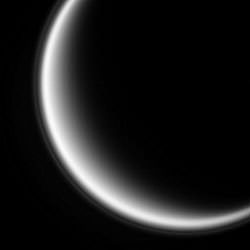
Thin haze around Titan. Image credit: NASA/JPL/SSI. Click to enlarge.
Looking back toward the sun brings out the thin haze that hovers 500 kilometers (310 miles) above Saturn’s moon Titan.
The haze is composed of small particles whose diameter is comparable to the wavelength of light, which is ultraviolet light centered at 338 nanometers. Particles of this scale scatter sunlight most effectively in the direction opposite to the direction of sunlight. Scientists are still trying to understand what processes produce this thin, high-altitude haze layer.
North on Titan is up and tilted 10 degrees to the right. Titan is 5,150 kilometers (3,200 miles) across.
This image was taken with the Cassini spacecraft narrow-angle camera on Sept. 24, 2005, at a distance of approximately 917,000 kilometers (570,000 miles) from Titan and at a Sun-Titan-spacecraft, or phase, angle of 145 degrees. Image scale is 5 kilometers (3 miles) per pixel.
The Cassini-Huygens mission is a cooperative project of NASA, the European Space Agency and the Italian Space Agency. The Jet Propulsion Laboratory, a division of the California Institute of Technology in Pasadena, manages the mission for NASA’s Science Mission Directorate, Washington, D.C. The Cassini orbiter and its two onboard cameras were designed, developed and assembled at JPL. The imaging operations center is based at the Space Science Institute in Boulder, Colo.
For more information about the Cassini-Huygens mission visit http://saturn.jpl.nasa.gov . The Cassini imaging team homepage is at http://ciclops.org .
Original Source: NASA/JPL/SSI News Release
